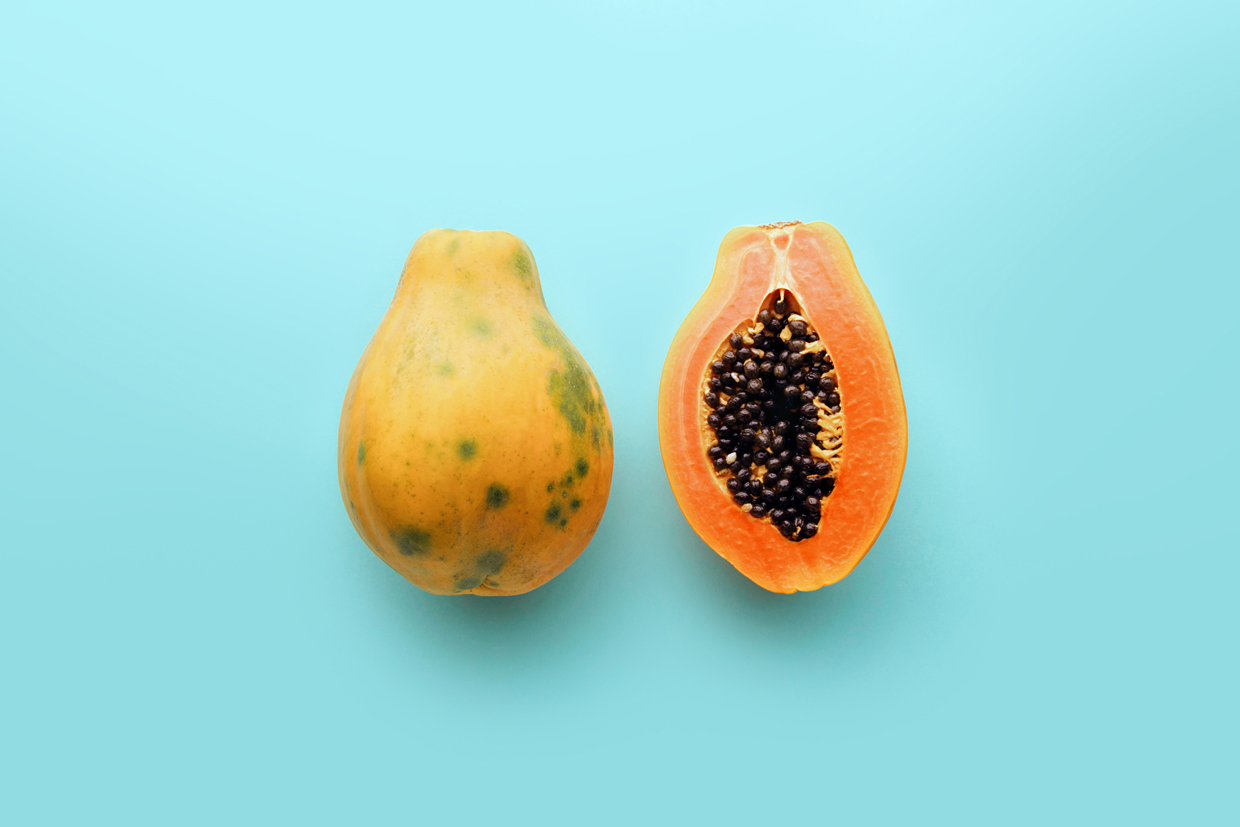Most of us have felt bloated before, but an unfortunate group of us tend to feel it a little more regularly. As uncomfortable and inconvenient as it is to feel puffy, full, or distended, the good news is that it’s usually nothing to be concerned about.
Simply put, bloat is the result of air or gas filling up the gastrointestinal tract, explains Lisa Richards, C.N.C., nutritionist and author of The Candida Diet. There is a myriad of factors that play a role in contributing to this air or gas entering the gut, with one of the main causes being food.
Foods that are rich in fat, for example, commonly lead to bloating, explains Nicole M. Avena, Ph.D., Assistant Professor of Neuroscience at Mount Sinai School of Medicine and Visiting Professor of Health Psychology at Princeton University and author of What to Eat When You Want to Get Pregnant. “Fats take longer to digest, so they can keep the stomach full for longer, which leads to the feelings of discomfort and pain associated with bloating,” she says. Certain foods, such as dried beans, broccoli, lentils and onion, are simply difficult for the body to break down and digest, per the Canadian Society of Intestinal Research, which leads to bloating and gas.

While food is a common contributing factor to bloating, there are also several foods that do quite the contrary — even helping to relieve our bloat. These foods do this by helping enhance our gut microbiome (the ratio of good-to-bad gut bacteria) and reduce the levels of water we retain, notes Richards.
We all get bloated here and there and certainly shouldn’t cut calories or meals altogether to keep our bloating to a minimum. There are, however, some foods that can help cut down on bloat. Here, experts share some of the best foods to eat if you’re looking to debloat.
Asparagus
This healthy vegetable is hailed for its dense fiber content. But in addition to regular fiber, it also contains inulin, a type of prebiotic fiber that keeps you full longer all while boosting the number of good-gut bacteria in your body. Also thanks to the high fiber content in asparagus, it acts as a diuretic, causing you to urinate more, which helps the body get rid of excess water, explains Frances Largeman-Roth, R.D.N., nutrition expert and author of Smoothies & Juices. She recommends eating asparagus grilled, sauteed or steamed as a side dish or for breakfast paired with eggs.
Avocado
This green, creamy fruit is packed with a ton of nutrients, many of which can help you debloat. Potassium, for example, helps regulate your body’s fluid balance and prevents it from holding on to liquids it doesn’t need. Avocados are also rich in fiber, to help regulate your digestive tract and prevent constipation, according to Largeman-Roth. She suggests adding a few slices to a salad or a slice of whole-grain toast.

Cucumbers
You may have seen this vegetable sliced up and used as an eye cover to help cut down on under-eye bags. It’s thanks to the antioxidant quercetin that cucumber can reduce swelling in the body. Cucumber also has a high water content, which can keep the gut and body hydrated and therefore prevent bloating, notes Richards. “If combining with condiments you’ll want to avoid those with dairy, as it can make bloating worse,” she adds.
Celery
Crunchy and green, this fan-favorite vegetable, which is the common base of most soups, is almost entirely made up of water (95 percent, according to the U.S. Department of Agriculture). Celery contains a type of sugar alcohol called mannitol, which helps regulate the digestive tract to prevent constipation, according to research in frontiers in Microbiology. While you can overdo it on the juiced version of celery (it can lead to diarrhea), eating this natural diuretic, or adding it to a smoothie is smart for fighting bloat, notes Largeman-Roth.

Apples
Apples are a rich source of pectin, a type of fiber found in fruits that aids in digestion by turning soluble fibers into a gel, explains Dr. Avena. “When consumed, pectin can help soften stool so that it moves at the proper speed, thus helping to reduce any feelings of bloating,” she says. “Apples are a great choice for a snack in between meals or as a late-night treat when you are craving something sweet.”
Papaya
This tropical fruit contains an enzyme called papain, which, Richards explains, is responsible for breaking down proteins in the gut which improves digestion and ultimately bloat. She recommends eating papaya raw as well by cutting it like a melon and scoping out the seeds. “It can be combined with other bloat-preventing fruits to make a fruit salad that will not cause discomfort,” she says.

Oatmeal
Fiber as a nutrient helps cut down on bloat, and oatmeal contains a healthy dose of it. In fact, one cup of cooked oatmeal contains 4 grams of fiber, which helps add bulk to your stool while also holding on to water, says Dr. Avena. As a result, your stool will be softer and easier to pass. “With your stool moving at the proper speed, bloating will not occur,” she says. She recommends adding oatmeal to your breakfast routine or your desserts (such as an oatmeal topping on a crumble) to ensure you consume ample fiber.
We only recommend products we have independently researched, tested, and loved. If you purchase a product found through our links, Sunday Edit may earn an affiliate commission.







